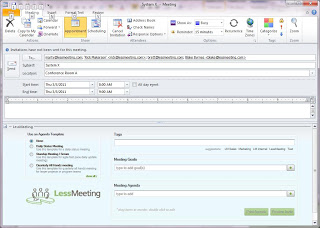 “It’s just a meeting agenda“, not long ago this short phrase sparked my interest. I began to think about the impact of meeting agendas (or lack thereof) on my companies productivity. Meeting studies show 63% of American meetings are run without an agenda. So the question is whether the 63% of meetings without an agenda are just as productive as those with a plan? To shed some light on the question I turned to my most trusted source, past experience.
“It’s just a meeting agenda“, not long ago this short phrase sparked my interest. I began to think about the impact of meeting agendas (or lack thereof) on my companies productivity. Meeting studies show 63% of American meetings are run without an agenda. So the question is whether the 63% of meetings without an agenda are just as productive as those with a plan? To shed some light on the question I turned to my most trusted source, past experience.
From time to time in the past I’m guilty of creating a meeting without an agenda. Mostly because I didn’t want to take time and write the agenda out (adding 3 to 5 bullets to a meeting invite can be very hard). It’s also possible that I was convinced my fellow attendees knew the purpose of the meeting. At any rate the decision was made to skip the agenda and save a couple minutes of real work time. Great news, I’m saving time without a meeting agenda! Now, what do I usually get in return for my 5 minute savings in time?
Typically, over the course of an hour meeting, I end up fighting a battle rather than conducting a discussion. The meeting seems to constantly get off track and never quite achieve the intended goal. Occasionally I’ve even wasted the time of an attendee or two that shouldn’t have been there in the first place. Typically the end result is another meeting, a fresh start, a do-over. Right? Not quite, time moves in one direction and every minute has a price.
The price for this lost opportunity is both tangible and intangible. The tangible cost is calculated in hourly rates per employees in attendance (typically 6), not to mention the cost associated with planning and scheduling the meeting (remember the 5 minutes). Because I failed to plan properly, my wasted hour has cost 6 hours and 5 minutes of real time that will never be returned. Also, I need to reschedule and have the meeting again, that means more time.
Although harder to calculate, the intangible cost is the potential business value of a lost hour (for each attendee). This cost will vary but in the case of a subject-matter-expert it can be very expensive. The unproductive hour the SME has spent with me is an unproductive hour for everyone that needs the help of this resource (think of it like down time for a machine on a factory floor). The lack of an agenda has also lead me to mismanage the attendee list, I’ve wasted the time of unneeded resources (shut down another machine on the floor). Finally I must not forget the reason I called the meeting in the first place, to make a decision. Well that decision will have to wait until I get all of the attendee calendars to line up for another meeting. I don’t have the energy to tackle this topic in depth but let’s just say the timeline is shot.
Ah, now it’s time for the So what… . I’ve lost a minimum of 6 hours and 5 minutes of time, not to mention I will eat more time with another meeting on the same topic. Tied up valued human resources that will not be helping others or gaining progress on existing work. Pushed the timeline of a decision that will affect the business and made myself look unorganized and unprofessional in the process (or lack of a process). Not to mention really upset my boss.
It seems the 5 minutes I saved by not planning the meeting properly and communicating an agenda to the participants was no saving at all. On the upside, I now know what the cost of an agenda is to my business.
It pains me to think that 63% of the 3 billion meetings in America have no agenda. What a waste, what could we do with all that additional time…



